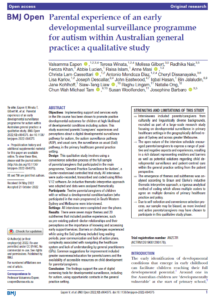 I’m a co-author on this paper on parental perspectives towards an autism screening program in Australian general practice published in BMJ Open. [PDF : URL]
I’m a co-author on this paper on parental perspectives towards an autism screening program in Australian general practice published in BMJ Open. [PDF : URL]
Eapen V, Winata T, Gilbert M, Nair R, Khan F, Lucien A, … Tam CWM, et al. Parental experience of an early developmental surveillance programme for autism within Australian general practice: a qualitative study. BMJ open. 2022;12(11):e064375.
Abstract
Objectives Implementing support and services early in the life course has been shown to promote positive developmental outcomes for children at high likelihood of developmental conditions including autism. This study examined parents’/caregivers’ experiences and perceptions about a digital developmental surveillance pathway for autism, the autism surveillance pathway (ASP), and usual care, the surveillance as usual (SaU) pathway, in the primary healthcare general practice setting.
Design This qualitative study involves using a convenience selection process of the full sample of parents/caregivers that participated in the main programme, ‘General Practice Surveillance for Autism’, a cluster-randomised controlled trial study. All interviews were audio-recorded, transcribed and coded using NVivo V.12 software. An inductive thematic interpretive approach was adopted and data were analysed thematically.
Participants Twelve parents/caregivers of children with or without a developmental condition/autism (who participated in the main programme) in South Western Sydney and Melbourne were interviewed.
Settings All interviews were completed over the phone.
Results There were seven major themes and 20 subthemes that included positive experiences, such as pre-existing patient–doctor relationships and their perceptions on the importance of knowing and accessing early support/services. Barriers or challenges experienced while using the SaU pathway included long waiting periods, poor communication and lack of action plans, complexity associated with navigating the healthcare system and lack of understanding by general practitioners (GPs). Common suggestions for improvement included greater awareness/education for parents/carers and the availability of accessible resources on child development for parents/caregivers.
Conclusion The findings support the use of digital screening tools for developmental surveillance, including for autism, using opportunistic contacts in the general practice setting.
